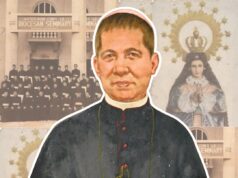OF ALL books to finish reading at the start of the Holy Week, mine had to be The Hedonism Handbook by one Michael Flocker, best known for his bestseller The Metrosexual Guide to Style.
Hedonism makes a moralist’s worst nightmare. Take the standard dictionary definition of the word: “pursuit of or devotion to pleasure, especially to the pleasures of the senses.”
As a philosophy, hedonism is “the ethical doctrine holding that only what is pleasant or has pleasant consequences is intrinsically good.”
In psychology, it is “the doctrine holding that behavior is motivated by the desire for pleasure and the avoidance of pain.”
“Pleasure is the beginning and the end of living happily.” So said the Greek philosopher Epicurus, which may have formed the basis for his eponymous philosophy of “Eat, drink, and be merry, for tomorrow you die.” Which, rightly or wrongly – all the latter never the former the moralists would howl – evolved as the hedonist’s article of faith.
So a hedonist is one who seeks pleasure and avoids pain at all cost. Ain’t all humans that way?
Asks Flocker: “But are the pursuit of pleasure and the avoidance of pain really such bad things? Don’t babies, universally considered to be the purest of all beings, gravitate to the warmth and satisfaction of the bosom? Don’t they wail at the discomfort of a full diaper and an itchy bunghole? Of course they do. They haven’t been programmed to discipline themselves into a ridiculous, unnatural and miserable state of Spartan self-denial.”
Postulates Flocker: ‘Pleasure is good. Eden was fun. Excess may be bad, but self-deprivation is just stupid. To live a life consisting only of hard work, virtue, sacrifice and self-discipline is to be a martyr, and martyrs make lousy lovers, friends and party guests. Of course, any good thing taken to the extreme inevitably turns bad, but when the true principles of hedonism are employed on a daily basis, the result is a happy person. Granted that happy person will undoubtedly piss off the martyr next door…”
Smug in my happy hedonistic thoughts, the call to martyrdom beckoned in the Passion Sunday sermon of my new parish priest in St. Jude Village, the Rev. Fr. Raul de los Santos, better known as Padre Bayong.
Suffering ennobles the man. On that basic Christian principle, the padre premised the definitive way of observing the Holy Week.
Ang paghihirap ay hindi tinatakasan. Suffering is not to be shunned. It is human nature to avoid pain. Even Christ in Gethsemane asked his Father “to let the cup pass.” It is precisely pain that provides the crucible that cleanses the human character. So we should indeed welcome suffering into our lives?
Ang paghihirap ay hindi ipinapasa. Suffering is not passed on to others. It is accepted, as Christ indeed accepted His cup thus, “Thy will be done.” A happy acceptance of suffering is a most Christian virtue.
Ang paghihirap ay iniaalay. Suffering is an offering. To the Almighty, in remorse, in penance for human failings; in prayerful thanksgiving for grace and blessings, in praise for His love of humankind. Suffering is an act of consecration – of oneself to Christ, mayhaps, even of oneness in Him in his very salvific act.
No room for complaints, even if only during the Holy Week, the good Fr. Raul enjoined his parishioners.
I wonder how many of us in that congregation could ever live up to that sermon. Even if only in this Holy Week.
So it is Christ this time of the year, and Epicurus at all other times. Bipolarization makes the best of both worlds. And they say bipolars are nuts!
Hedonism makes a moralist’s worst nightmare. Take the standard dictionary definition of the word: “pursuit of or devotion to pleasure, especially to the pleasures of the senses.”
As a philosophy, hedonism is “the ethical doctrine holding that only what is pleasant or has pleasant consequences is intrinsically good.”
In psychology, it is “the doctrine holding that behavior is motivated by the desire for pleasure and the avoidance of pain.”
“Pleasure is the beginning and the end of living happily.” So said the Greek philosopher Epicurus, which may have formed the basis for his eponymous philosophy of “Eat, drink, and be merry, for tomorrow you die.” Which, rightly or wrongly – all the latter never the former the moralists would howl – evolved as the hedonist’s article of faith.
So a hedonist is one who seeks pleasure and avoids pain at all cost. Ain’t all humans that way?
Asks Flocker: “But are the pursuit of pleasure and the avoidance of pain really such bad things? Don’t babies, universally considered to be the purest of all beings, gravitate to the warmth and satisfaction of the bosom? Don’t they wail at the discomfort of a full diaper and an itchy bunghole? Of course they do. They haven’t been programmed to discipline themselves into a ridiculous, unnatural and miserable state of Spartan self-denial.”
Postulates Flocker: ‘Pleasure is good. Eden was fun. Excess may be bad, but self-deprivation is just stupid. To live a life consisting only of hard work, virtue, sacrifice and self-discipline is to be a martyr, and martyrs make lousy lovers, friends and party guests. Of course, any good thing taken to the extreme inevitably turns bad, but when the true principles of hedonism are employed on a daily basis, the result is a happy person. Granted that happy person will undoubtedly piss off the martyr next door…”
Smug in my happy hedonistic thoughts, the call to martyrdom beckoned in the Passion Sunday sermon of my new parish priest in St. Jude Village, the Rev. Fr. Raul de los Santos, better known as Padre Bayong.
Suffering ennobles the man. On that basic Christian principle, the padre premised the definitive way of observing the Holy Week.
Ang paghihirap ay hindi tinatakasan. Suffering is not to be shunned. It is human nature to avoid pain. Even Christ in Gethsemane asked his Father “to let the cup pass.” It is precisely pain that provides the crucible that cleanses the human character. So we should indeed welcome suffering into our lives?
Ang paghihirap ay hindi ipinapasa. Suffering is not passed on to others. It is accepted, as Christ indeed accepted His cup thus, “Thy will be done.” A happy acceptance of suffering is a most Christian virtue.
Ang paghihirap ay iniaalay. Suffering is an offering. To the Almighty, in remorse, in penance for human failings; in prayerful thanksgiving for grace and blessings, in praise for His love of humankind. Suffering is an act of consecration – of oneself to Christ, mayhaps, even of oneness in Him in his very salvific act.
No room for complaints, even if only during the Holy Week, the good Fr. Raul enjoined his parishioners.
I wonder how many of us in that congregation could ever live up to that sermon. Even if only in this Holy Week.
So it is Christ this time of the year, and Epicurus at all other times. Bipolarization makes the best of both worlds. And they say bipolars are nuts!




